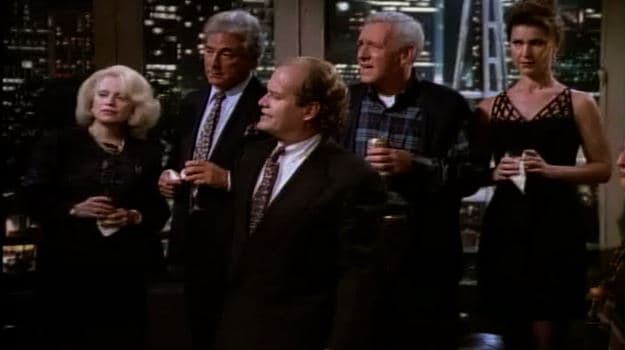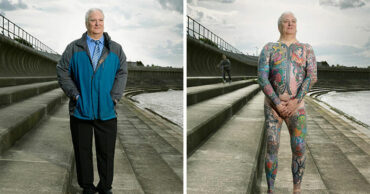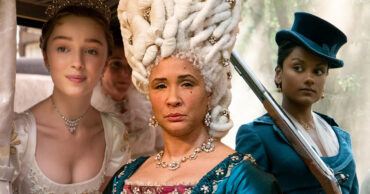
“The Crucible” opens like many late-season Frasier episodes do, with Frasier’s pretensions leading him into absurd conflict with the world around him. The first two acts are essentially the blueprint for which the show would produce a few dozen middling episodes from throughout the series: Frasier buys a piece of art from the famous local artist Martha Paxton, then seeks “vengeance” when the eccentric artist (with a shaved head “like a Crenshaw melon”) arrives at his party and denounces it as a fake. Of course, this sends Frasier into a predictable tizzy, only enhanced when the weird art shop owner laughs off his demand for a refund, and he’s sent home fuming in search of his karmic “justice.”
The fact I can sum up the entirety of the first two acts in less than 100 words speaks to the simplicity of the plot: this episode is completely constructed around the exaggeration of Frasier’s behavior, providing the importunity for Kelsey Grammar to showcase his stage presence. It’s apparent in nearly every scene; he hams for the audience while on the phone with the police (Marty tells him to ask for the “Fine Arts Forgery” department), and behaves like a caricature of himself when Paxton visits his apartment, a tone that thoroughly dominates the first eighteen minutes of the episode. When Marty reminds him that there’s often no justice in this world, he dramatically declares he’s going to go throw a brick through the man’s storefront – but seeing as he’s drinking a glass of sherry with Niles (who is looking for the earring Maris left on Frasier’s bed while she slept through the party), it’s hard to take the man seriously.
Until we cut to a title card (“Peachfuzz”), and then there’s Frasier, brick in hand, standing outside the art gallery. Frustrated that he was swindled and humiliated by his friends, the good doctor stands poised, ready to toss the brick through the man’s window. He hesitates for a moment, and Niles pulls up (in his Lexus, of course), and gets out of the car. After a brief exchange, Niles tells a story about how athletes in middle school stole his school clothes while he was in the shower, hanging them on the goal post so Niles would have to retrieve them, exposed to the entire class. Before he could exact his revenge on the gym teacher who let it all happen, a young Frasier stopped him, and reminded him that they “were better than that,” siblings too cultured and righteous to stoop to such a level.
Niles reminds him of this while he removes the brick from his hand, and then Frasier thanks him. This moment encapsulates much of the relationship between these two brothers; they examine their childhoods in adult life, using their psychological backgrounds to try and access the underlying frustrations they feel. As a show centered around three males (especially in the early seasons), masculinity is very much a focal point of these discussions: most of the time, it’s flavored with the Oedipal relationships Niles and Frasier both have with their parents, informing their behavior through surface-level observations of their behavior.
“The Crucible” goes for something a little bit deeper: it accesses masculinity through adolescence, that formative period so key in the show’s Freudian underpinnings. And in there, it explores Frasier and Niles’ humiliation they felt at being “different,” something that’s clearly affected them their whole lives. Though they’ve always been able to exercise their intellectual superiority over their foes, being unable to exact physical (or even karmic), masculine-aligned forms of vengeance and exert their dominance is something that’s always limited them, particularly in the light of who their father was, and how he wishes they always behaved. Their discussion,while focused on Frasier’s behavior in the moment and Niles’ traumatic experience, is really conveying something about the psychology of masculinity in young males, and how both siblings and traumatic experiences can influence that development; clearly there are times when Niles and Frasier are uncomfortable with their inability to take control of events, and that’s expressed beautifully in their conversation outside the man’s store.
It ends on a hilarious note; after Frasier exposes the nicknames Coach gave Niles (including the titular Peachfuzz), Niles throws the brick through the window himself, and the two drive off, bringing the episode to an end. We’ll always be slaves to certain traumatic experiences in our life; and while being swindled out of art challenged Frasier’s sense of masculinity, Niles’ horrible experience defined it for him at a young age, and leads to a much more complex, layered resolution than the initial events of “The Crucible” would suggest. Is the shift jarring? Absolutely – and for the most part, it completely abandons the secondary cast and any B-stories in favor of Frasier antics early on, lending the episode to feel quite unbalanced, shifting from near-farce in the second act, to somber character exploration in its final scene. However, there’s no denying the powerful image of Niles throwing the brick through that window, and for a moment, taking control: it says a lot about the tension he lives with (both from his general personality, and the anxiety of his marriage), and ends “The Crucible” with a spectacularly satisfying bang.
Other thoughts/observations:
– A summation of Daphne’s thoughts on what happens before death: you walk down a dark hallway, suddenly get all the jokes you never got, chuckle, then die.
– Frasier, upon Roz’s arrival at the party: “Oh my goodness Roz, you’ve got a neck!”
– Frasier has to stop his father from showing house guests pictures from bloody murder scenes. “She said, aren’t these Swedish meatballs the messiest things you’ve ever seen? And I said, matter of fact, it is not.”
– Daphne’s opinion of Martha showcases Jane Leeves’ mastery of punch lines: “Quite frankly, I don’t think that woman bathes.”
– “I’m not leaving until I get a refund!” Cut to inter title “AFTER HE LEAVES…”
– After smashing the window, Niles throws cash out of his wallet at the broken glass on the sidewalk. “We may be barbarians, but we pay for our pillaging!”
[Photo via NBC]
 Follow Us
Follow Us





